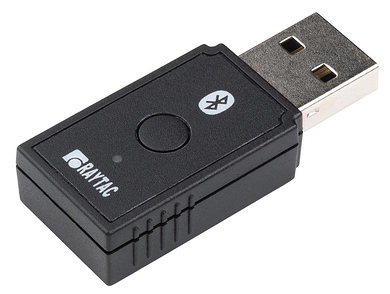This USB dongle from Adafruit contains an nRF52840 ARM Cortex M4F processor running at 64MHz, with 1 Mbyte of flash and 256 Kbytes of RAM. It should run ARM uLisp nicely, with similar performance to the Adafruit ItsyBitsy nRF52840:
Order it from Adafruit here: nRF52840 USB Key with TinyUF2 Bootloader
or from Tindie here: nRF52840 USB BT5.2 Dongle Raytac MDBT50Q-RX
The Tindie version doesn’t have a TinyUF2 Bootloader installed, but you should be able to program the board with a suitable programmer via the SWDIO and SWCLK pins that are accessible inside the case.

